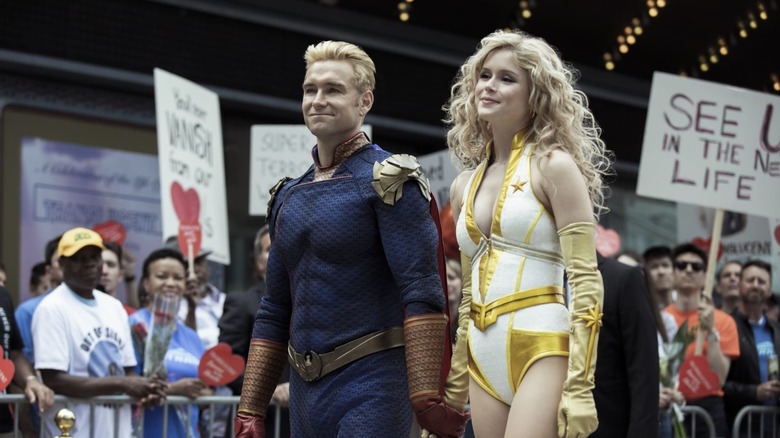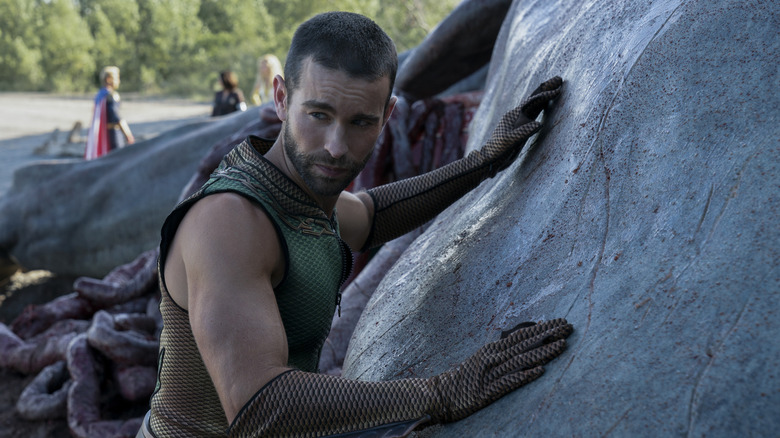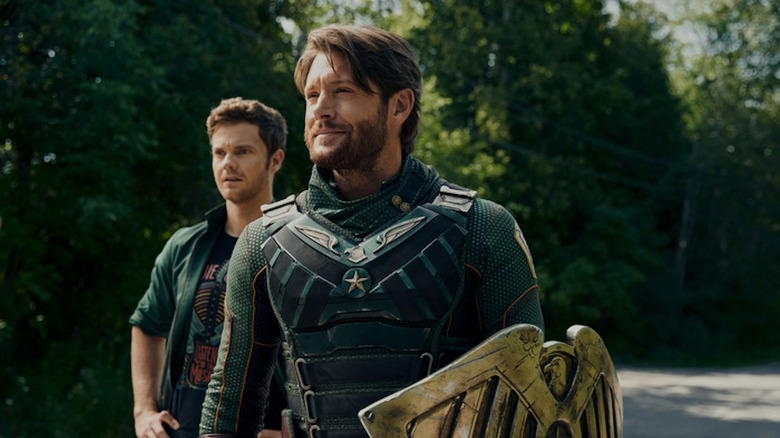Why The Boys Showrunner Thinks Its A Mistake To Make Your Series A 10-Hour Movie
"The Boys" is often compared favorably to the Marvel TV shows of recent years, and it's easy to see why: the quality of "The Boys" is more consistent, it's a little more sophisticated in its themes and commentary, and it's got a fascinating villain that actually sticks around long enough to make an impact. Maybe most important, however, is that "The Boys" is actually structured like a TV show. Although it's still serialized and each episode furthers the larger plot, the show also makes sure each episode generally stands on its own. This is an intentional strategy of Eric Kripke, who is not a fan of Marvel's approach of treating its six-episode seasons like six-hour movies split into pieces.
"The downside of streaming is that a lot of filmmakers who work in streaming didn't necessarily come out of that network grind," Kripke said in a 2022 interview with Variety. "They're more comfortable with the idea that they could give you 10 hours, where nothing happens until the eighth hour. That drives me f**king nuts, personally."
At first glance, this is a confusing complaint, because exactly what sort of movies is Kripke watching where "nothing happens" until 8/10ths of the way through? That doesn't sound like a good format for a movie either, nor is it a common one. Of course, what he's really referring to is the general plot structure where the movie's climax (the part that tends to stick with audiences the longest) doesn't happen until close to the end. The TV equivalent to this is a season that tells a single story over 10 episodes or so, building up to one major climax that hits in episode 9. It's a format that's grown incredibly popular over the past decade, and Kripke's had enough of it.
Times have changed
"As a network guy who had to get you people interested for 22 f**king hours a year, I didn't get the benefit of, 'Oh, just hang in there and don't worry. The critics will tell you that by episode 8, s**t really hits the fan,'" Kripke explained. "Or anyone who says, 'Well, what I'm really making is a 10-hour movie.' F**k you! No, you're not! Make a TV show."
Sure enough, this attitude is reflected in "The Boys," a show where the episodes rarely blend together the way they tend to do on other streaming platforms. Although the first season was dropped entirely under the binge model, fans can still remember its individual episodes. There's the one where the Boys have to figure out how to kill an invincible supe, or the one where the Boys go to the hyper-Christian camp event, or the one where Annie finds out the truth about Hughie. The show's still serialized, but each episode still tells its own story. Instead of treating the whole season as a big movie split into pieces, the show treats each episode more like a mini-movie.
Of course, the other approach isn't always terrible. "The Wire" is a show that's commonly recommended with the caveat of "give it a few episodes," whose seasons are often referred to as 10 to 13-episode movies, and most people would agree it's one of the best shows of all time. But as the (justified!) backlash against binge TV grows, it's become increasingly clear that Kripke's approach to TV is smarter and more effective overall.
An unfortunate trend
Although Kripke's complaining about TV shows in particular, this issue is hardly contained to just modern TV. Fans of video games have long complained about how so many games are trying to mimic the format of movies and TV, and how the rest of the entertainment industry seems to reward the games for doing this. "The Last of Us," for example, was treated as more legitimate than other video games in part because it was already structured like the prestige drama it would one day be adapted into.
Because film and TV are viewed as more "respectable" forms of entertainment, it's become common for video game writers to sideline the strengths of their own medium in favor of capturing the strengths of TV and film. The book world faces a similar issue, as it's become more common for a book to feel like it's been written specifically in the hopes of getting a movie adaptation.
Although the gap between TV and film is smaller than those other gaps, the solution's still clear: writers should craft a story that fits the medium they're telling, not another medium they consider more prestigious. Some viewers may complain about television's slower pace, or TV's tendency to throw in the occasional experimental episode that doesn't advance the plot as much as fans might hope, but TV's ability to do stuff like this is exactly what makes the medium so fun and surprising in the first place. As even Netflix seems to be growing disillusioned with the binge model format, hopefully, more TV shows will stop trying so hard to be something they're not.


